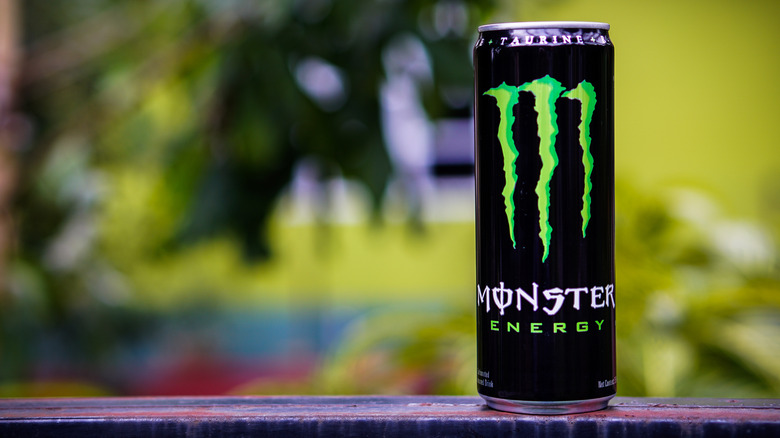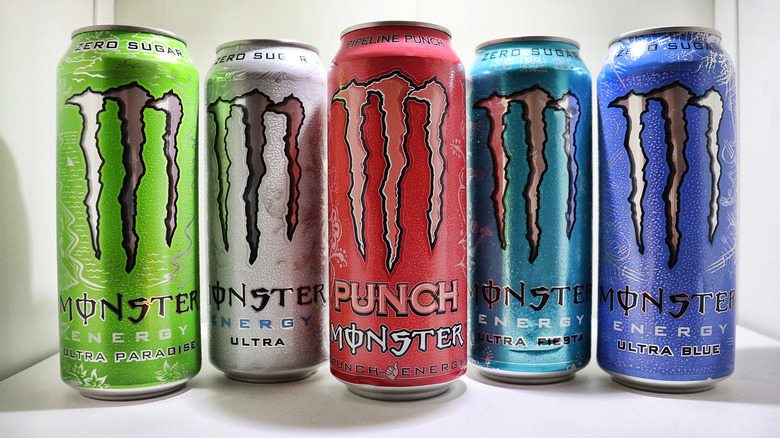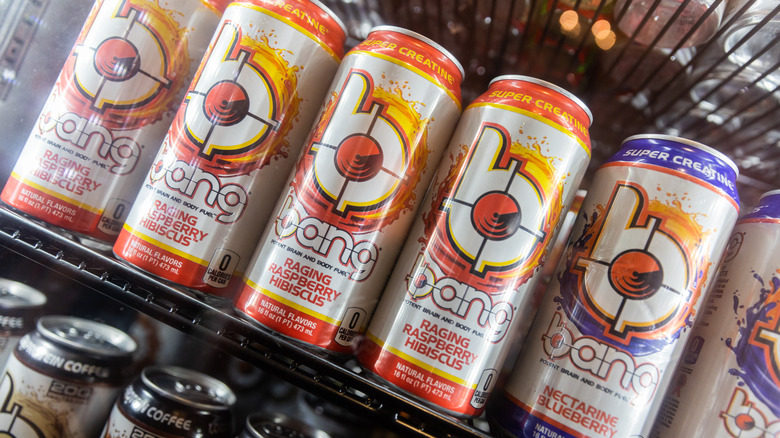Monster Plans To Acquire Bang Energy For A Possible $362 Million
Bang Energy's marketing has shaped the public's image of the drink into something of a non-alcoholic Four Loko, almost reminiscent of the electric green SURGE of the '90s. (Think loud speaking volumes, hyper-fast movements, and general chaos a la neo-Futurism-meets-professional-skateboarder.) But, judging by recent legal rulings, this brand of zany enthusiasm hasn't been enough to keep the energy drink afloat. On June 28, a deal was made in the U.S. Bankruptcy Court for the Southern District of Florida, and Monster Beverage is buying Bang Energy for $362 million. The purchase is currently under review by the Federal Trade Commission so it has not yet been officially executed, but it's expected to proceed as planned following approval, reports Food Dive.
In a last-ditch effort sort of way, this deal could actually be good news for both brands. If for some reason the deal doesn't go through, Bang will likely be forced to liquidate its assets and tap out of the game entirely. According to attorney Andrew Sorkin, an estimated 700 Bang employees would suddenly be out of a job. Bang first filed for bankruptcy in October 2022 — and Monster isn't the only competitor Bang has been battling since then, either.
A bright future for Monster
Bang Energy has been experiencing financial troubles lately and Monster has been killing it. In the Q3 sales period in 2022, pretty much every leading energy drink brand enjoyed a significant increase except, sorely, for Bang. Monster went up 11.2%, Rockstar went up 8.1%, Red Bull went up 6.2%, and Bang dropped by 27.3%. Buying out a rival brand is another big win for Monster, which saw $6.31 billion in sales in 2022 alone. Monster holds a domineering 35.1% of the energy drink market, compared to Bang's 2.6%.
Monster even recently sued Bang in one of the largest Lanham Act settlements in U.S. history. Last fall, Monster Beverage won a $293 million false advertising lawsuit after Bang Energy unlawfully advertised its drinks as some sort of holistic cure that's "20 times more effective at reaching the brain than other forms of creatine," and can cure Alzheimer's, Parkinson's, and even "reverse mental retardation," reports Reuters. Then in April, Monster sued Bang again for trying to label its cans as "Super Creatine" (Bang does not contain any creatine). The California Federal Court ordered a permanent injunction on Bang.
Monster Beverage's portfolio now includes traditional carbonated energy drinks, iced teas, juice cocktails, dairy beverages, coffee drinks, water, and even craft beer. This diverse portfolio and formidable market presence make Monster an industry giant, and it doesn't look like company growth is slated to slow any time soon — especially now that Bang is no longer in the running.
Were leadership and business strategies to blame for the end of Bang?
PepsiCo and Bang Energy have had a nasty falling out over the past few years. PepsiCo was formerly the energy drink's exclusive distributor, bringing publicity and popularity to the bevy. Bang terminated the partnership in October 2020 to fly solo, when founder and former CEO Jack Owoc sent a scathing letter, writing, "[W]e sincerely expected PepsiCo to execute at an even higher level based on their enormous resources and promises. Unfortunately, we were wrong. PepsiCo, you're fired," via a press release. Now, it looks like maybe they should have maintained relations after all. (Owoc is no longer the CEO of Bang Energy.)
Bang Energy's former captain might have been a sinking ship himself. At a Manhattan industry conference in June 2022, then-CEO Owoc took the stage highly caffeinated, telling the audience, "Look, we've got to take this up a notch so can I ask everybody to stand up, please, because this is Bang Energy, I exude energy, I am energy," per Bloomberg. The billionaire also reportedly refused to sit down despite the moderator's repeated requests for him to join him in the chairs for the Q&A. The outlet suggested the drink brand could be failure bound.


